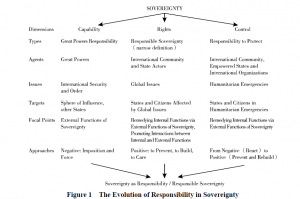Hello teammates,
Please see below for my three definitions assignment.
Best,
Eugenia
—
Introduction
The purpose of this assignment is to gain insight into the role of definitions and appreciate their importance with regard to technical writing. The target audience and purpose will determine the need for definition. There are three levels of definition that are differentiated based on the amount of detail given. This includes the parenthetical definition, the sentence definition, and the expanded definition. It is the writer’s responsibility to select the right level of detail according to the situation. The criteria for this assignment is to envision a situation where an expert is explaining a relatively complex term used in their field to a non-technical audience using the three different kinds of definitions. In this scenario, a political science professor is explaining the concept of sovereignty to a freshman student who has no knowledge of the subject.
Term
Sovereignty
Parenthetical Definition
A country’s ability to practice sovereignty (supreme legitimate control over a central government body) includes having a cooperative population who consents to that authority.
Sentence Definition
When used in a political context, sovereignty is the full right and power of a governing body over itself without external interference.
Expanded Definition
Sovereignty is the concept that states are in complete and exclusive control of property and people within their set territory (“The Issue of Sovereignty” para. 1). The term sovereignty loosely originates from the Latin word superanus, meaning ‘ruler’ or ‘chief’ and has been used as far back as Ancient Rome. Like with many political concepts, the definition of sovereignty has changed both in meaning and in application within the realm of international politics (See figure 1). However, most political theorists would agree that at its most basic level, sovereignty reflects an ever-evolving relationship between state actors, political institutions and communities which work to determine how political power is exerted or how it should be exerted. To reiterate, sovereignty does not mean that one state or international organization has control over another state, but rather a state’s ability to control its own internal affairs.
International law recognizes a sovereign state if it possesses a centralized government with jurisdiction over a specific territory, maintains the ability to enter into relations with other states, is not subjected to the laws of a separate state and has a fixed population (Shaw 178). Furthermore, many political theorists would connect a few other characteristic features to the concept of sovereignty. Firstly, sovereignty is thought to be absolute in nature both internally and externally. This means that once state sovereignty has been achieved, no other state or person living within the governed territory can invalidate that sovereignty. Secondly, the sovereign state is supreme with its rights and responsibilities which no person or organization can claim exception. Thirdly, the rights of the sovereign can be transferred, for example power changes hands during an election, but sovereignty itself is inalienable. As such, sovereignty acts without the limitation of time. For instance, the death of a politician or constitutional monarch does not destroy the sovereignty of a state. Finally, sovereignty is indivisible, which means that sovereignty of a state cannot be divided. If it is, then two separate sovereign states exist as opposed to just the one (Weizhun & Yongguang 109). As the definition of sovereignty continues to evolve due to globalization and other global events, it is important to recognize the historical definition of the term when putting the concept to the test on the international political stage.

Works Cited
Shaw, Malcolm N. (Malcolm Nathan). International Law / Malcolm N. Shaw. Eighth edition.,
Cambridge University Press, 2017.
“The Issue of Sovereignty.” Globalization101, 2016, www.globalization101.org/the-issue-of-sovereignty/.
Weizhun, Mao & Yongguang, Bu. (2016). “Sovereignty as Responsibility ” Intellectual Sources,
Evolving Paths, and Theoretical Debates. International Security Studies. 95-119.
Leave a Reply